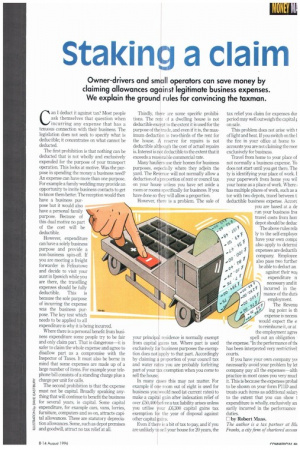Staking a claim
Page 45

If you've noticed an error in this article please click here to report it so we can fix it.
Owner-drivers and small operators can save money by claiming allowances against legitimate business expenses. We explain the ground rules for convincing the taxman.
Can I deduct it against tax? Most people ask themselves that question when incurring any expense that has a tenuous connection with their business. The legislation does not seek to specify what is deductible; it concentrates on what cannot be deducted.
The first prohibition is that nothing can be deducted that is not wholly and exclusively expended for the purpose of your transport operation. This looks at motive. Was the purpose in spending the money a business need? An expense can have more than one purpose. For example a family wedding may provide an opportunity to invite business contacts to get to know them better. The reception would then have a business purpose but it would also have a personal family purpose. Because of this dual motive no part of the cost will be deductible.
However, expenditure can have a solely business purpose and provide a non-business spin-off. If you are meeting a freight forwarder in Felixstowe and decide to visit your aunt in Ipswich while you are there, the travelling expenses should be fully deductible. This is because the sole purpose of incurring the expense was the business purpose. The key test which needs to be applied to all expenditure is why it is being incurred.
Where there is a personal benefit from business expenditure some people try to be fair and only claim part. That is dangerous—it is safer to claim the whole expense and agree to disallow part as a compromise with the Inspector of Taxes. It must also be borne in mind that some expenses are made up of a large number of items. For example your telephone bill consists of a standing charge plus a charge per unit for calls.
The second prohibition is that the expense must not be capital. Broadly speaking anything that will continue to benefit the business for several years, is capital. Some capital expenditure, for example cars, vans, lorries, furniture, computers and so on, attracts capital allowances. These are statutory depreciation allowances. Some, such as depot premises and goodwill, attract no tax relief at all. Thirdly, there are some specific prohibitions. The rent 0( a dwelling house is not deductible exce; it 10 the extent it is used for the purpose of the trade, and even if it is, the maximum deduction is two-thirds of the rent for the house. A reserve for repairs is not deductible although the cost of actual repairs is. Interest is not deductible to the extent that it exceeds a reasonable commercial rate.
Many hauliers use their homes for business purposes, especially where they adjoin the yard. The Revenue will not normally allow a deduction of a pnoortion of rent or council tax on your house unless you have set aside a room or rooms specifically for business. If you have done so they will allow a proportion.
However, there is a problem. The sale of your principal residence is normally exempt from capital gains tax. Where part is used exclusively for business purposes the exemption does not apply to that part. Accordingly by claiming a proportion of your council tax and water rates you are probably forfeiting part of your tax exemption when you come to sell the house.
In many cases this may not matter. For example if one room out of eight is used for business you would need (at current rates) to make a capital gain after indexation relief of over £50,400 before a tax liability arises unless you utilise your £6,300 capital gains tax exemption for the year of disposal against other capital rains.
Even if there is a bit of tax to pay, and if you are unlikely to sell your house for 20 years, the tax relief you claim for expenses dur period may well outweigh the capital on sale.
This problem does not arise with t of light and heat. If you switch on thel the fire in your office at home to accounts you are not claiming the roor exclusively for business.
Travel from home to your place of not normally a business expense. Yo does not start until you get there. The ty is identifying your place of work. I your paperwork from home you wil your home as a place of work. Where ; has multiple places of work, such as a tor with two depots, travel between t deductible business expense. Accorc you are based at a de run your business froi travel costs from horr depot should be deduc The above rules rela ly to the selfemployei have your own comp also apply to determi expenses are deductib company. Employee also pass two further be able to deduct an against their wai expenditure it necessary and it incurred in the mance of the dun' employment.
The Revenu ing point is th expense is necess would expect the e to reimburse it, or at the employment agree spell out an obligation the expense. "In the performance of the has been interpreted very restrictive]: courts.
If you have your own company yoi necessarily avoid your problem by let company pay all the expenses—alth practice in most cases you very mud it. This is because the expenses probal to be shown on your form PhD and treats such items as additional &liar) to the extent that you can show t expenditure is wholly, exclusively an sarily incurred in the performance duties.
C. by Robert Maas.
The author is a tax partner at B16 Franks, a city firm of chartered at:cour








































































































